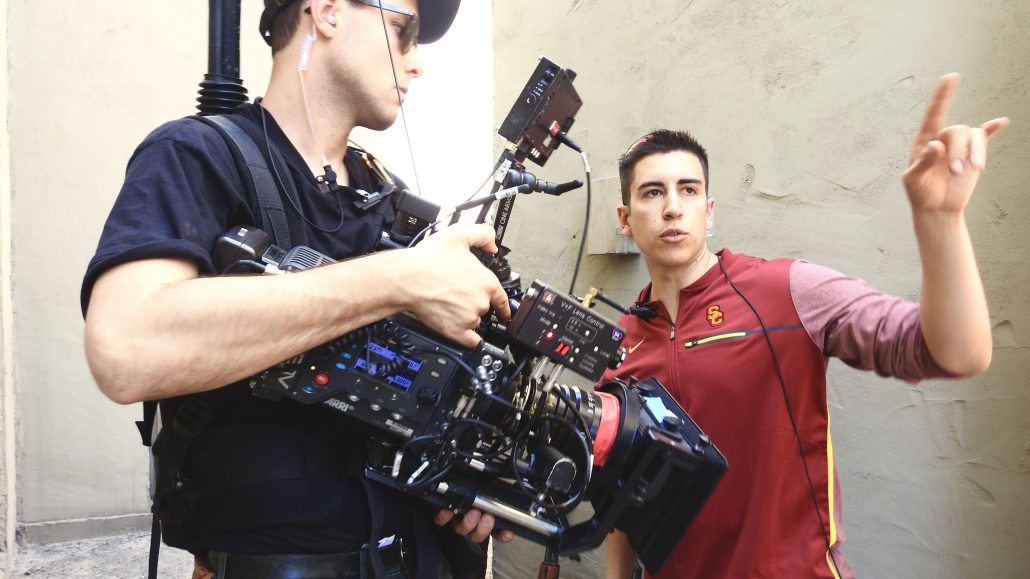SCA Alumni debuts thesis film centered on war veterans

Less than 30 seconds into describing his thesis film “The Gatekeeper,” director and USC graduate student earning an MFA in Film and Production Jordan Martinez was already comparing it to Vincent Ward’s “What Dreams May Come” and Clint Eastwood’s “American Sniper” — a rather jarring hybridization. However, the more details Martinez shared, the more the two projects’ crossbreeding made sense.
“The Gatekeeper” is a 17-minute military thriller starring Christopher Loverro and Jennifer Marshall. “Awakening in a war-zone on the precipice of life and death, an Army First Sergeant confronts the causatum of his own orders to see his family again” reads its logline — after over a year of detailed, in-house production and post-production at USC, Martinez is excited to share it with the community.
“[The Gatekeeper] is a timely type of film, and it’s an authentic film,” Martinez told the Daily Trojan. Due to the film’s harsh subject matter, Martinez and his team were careful making sure that everything both in front of and behind the camera was handled with as much nuance, authenticity and understanding of military life as possible.
Loverro is himself an Iraq War veteran and former SWAT Officer. Just like her character in the film, Marshall is a military wife, as well as a former Navy Officer. Active Duty Marine Corps are featured in the film. In addition to using real decommissioned military uniforms, the project was shot partially on-location near Edwards Air Base, a place Martinez himself used to jump out of planes during his time in the army.
Martinez’s Command Sergeant Major Daniel Stroud — who served with Loverro overseas seven years earlier — also helped with critical aspects of production. Both a craftsman (who helped Martinez “literally [see] things together”) and an adviser, using 20-plus years of expertise to capture protocol as true-to-life as possible, Stroud was one of the many veterans who showed passion and support for Martinez’s piece.
“We tried our best to [include] the veteran community,” Martinez said. “[The film] focuses on veteran issues: integrating back into society, trying to adjust.” As Martinez was speaking, one of his visual effects artists and a graduate student in mechanical engineering, Pang-Wei Yen, walked past and validated that most creative input for the film has come from people with military backgrounds.
“I’m from Taiwan … Every male [has] mandatory military [service] for one year over there,” Yen said.
He noted that his service was definitely different from Martinez’s, but stated that the team is working to make sure that the war aspect of the film is authentic right down to the composites. This authenticity is what begs the “American Sniper” parallel, but it’s the focus and ambition with special effects that Martinez likens to “What Dreams May Come.”
“Right now, it has … from my understanding, the most amount of special effects out of any USC film I’ve ever known — especially as far as war special effects.” Martinez said.
Every course Martinez has taken at USC so far has been incorporated into this project in some shape or form. From Michael Finks’ “Directing In A Virtual World” to Visual Effects Supervisor of “John Wick Chapter 3” Robert Nederhorst’s “Live Action Integration With Visual Effects,” classes — all Martinez’s coursework has been building up to this thesis film.
With the guidance of professor John Brennan, all of “The Gatekeeper” was shot using motion capture previsualization, a cinematographic game plan to help a film crew visualize complex scenes before filming. “Motion-capture previsualization” is usually reserved for films like James Cameron’s “Avatar” and Steven Spielberg’s “Ready Player One,” blockbusters with at least $100 million budgets.
Although Martinez acknowledged that the production process was “grueling,” he remained committed to the film’s important themes throughout.
“I wanted to make a film that really could speak to veterans…and [helps] civilians understand the complexities of what [veterans] are thinking and what they’re going through,” Martinez said. “There are artistic sides to veterans … There’s lots of [war] stories that people need to tell and want to tell and people want to hear them.”
“The Gatekeeper” will be screened this December at USC before it makes its way through the fall festival circuit.

